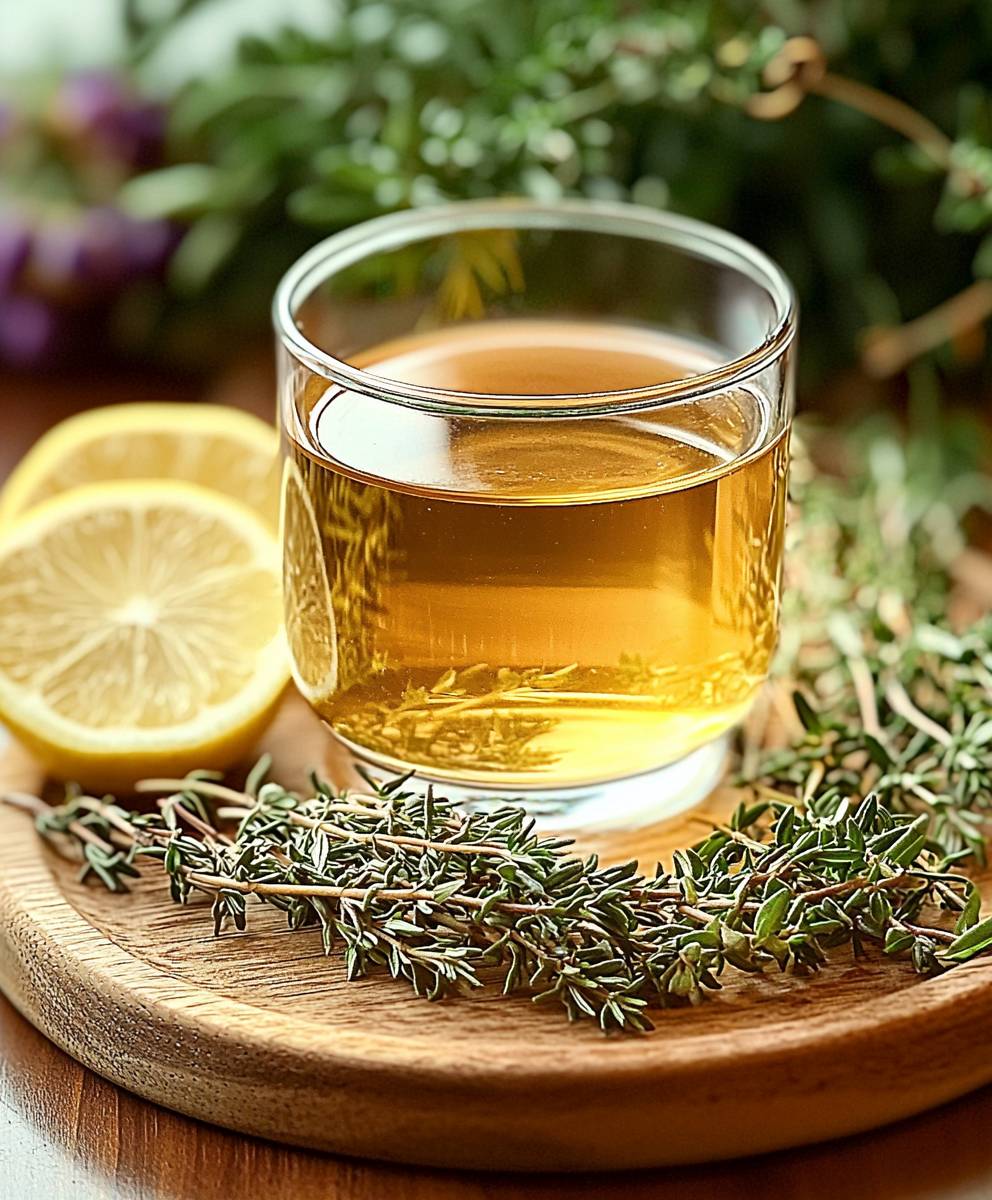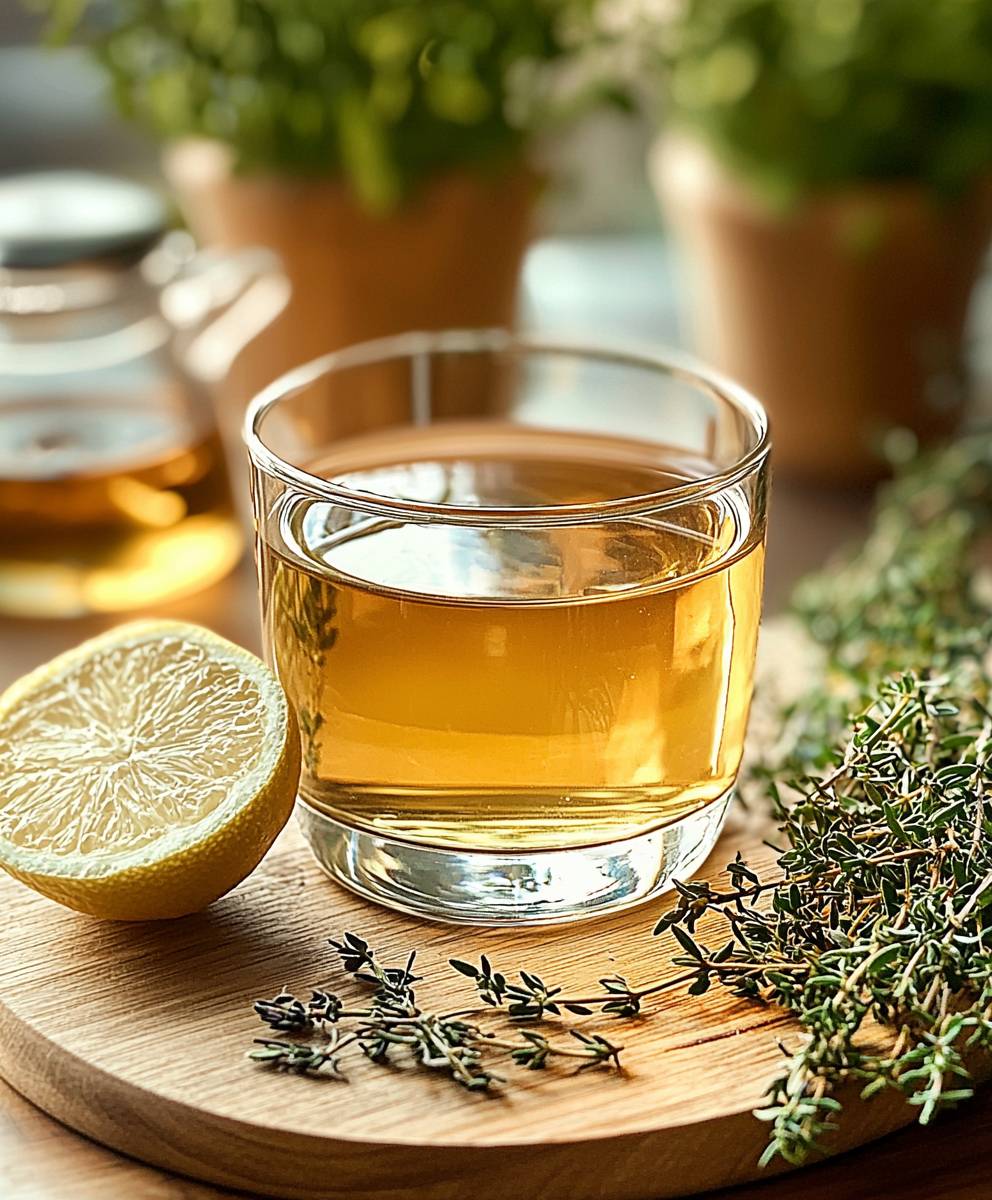Thyme rosemary tea benefits are something I’ve become intimately acquainted with over the years, and I’m thrilled to share my knowledge with you! Imagine a warm, fragrant cup, its steam carrying the earthy scents of the Mediterranean, promising not just comfort but a wealth of wellness. This isn’t just another herbal infusion; it’s a time-honored elixir with roots stretching back centuries.
Historically, both thyme and rosemary have been revered for their medicinal properties. Ancient Egyptians used thyme in embalming, while the Romans believed rosemary improved memory. Combining these two powerhouses creates a synergistic effect, amplifying their individual benefits. But beyond its historical significance, why do people adore this tea? It’s simple: the taste is divine! The slightly peppery notes of thyme perfectly complement the piney aroma of rosemary, creating a balanced and invigorating flavor profile. Plus, it’s incredibly easy to prepare, making it a convenient and healthy addition to your daily routine. Whether you’re seeking to boost your immune system, soothe a sore throat, or simply unwind after a long day, exploring thyme rosemary tea benefits is a journey worth taking. Let’s dive in and discover all the wonderful things this herbal blend has to offer!
Ingredients:
- 4 cups of water, preferably filtered
- 4 sprigs of fresh thyme, washed thoroughly
- 2 sprigs of fresh rosemary, washed thoroughly
- 1 tablespoon of honey (optional, for sweetness)
- 1 lemon slice (optional, for added flavor and Vitamin C)
Preparing the Thyme Rosemary Infusion:
- Bring the water to a boil. In a medium-sized saucepan, pour in the 4 cups of filtered water. Place the saucepan over medium-high heat and bring the water to a rolling boil. Watch carefully to prevent it from boiling over.
- Prepare the herbs. While the water is heating, gently wash the thyme and rosemary sprigs under cool running water. This removes any dirt or debris. Pat them dry with a clean paper towel. You can lightly bruise the leaves of the rosemary and thyme by gently squeezing them between your fingers. This helps to release their essential oils and enhance the flavor of the tea.
- Infuse the herbs. Once the water is boiling, carefully add the thyme and rosemary sprigs to the saucepan. Reduce the heat to low, so the water is simmering gently. Cover the saucepan with a lid.
- Simmer for 15-20 minutes. Allow the herbs to simmer in the water for 15 to 20 minutes. This steeping time allows the flavors and beneficial compounds from the thyme and rosemary to fully infuse into the water. The longer you steep, the stronger the flavor will be. I usually go for 20 minutes for a robust taste.
- Remove from heat and let steep further (optional). After simmering, remove the saucepan from the heat. Leave the herbs in the water and let them steep for an additional 5-10 minutes. This further enhances the flavor and allows for a more concentrated infusion.
Straining and Serving:
- Strain the tea. After the steeping process is complete, carefully strain the tea through a fine-mesh sieve or a cheesecloth-lined colander into a heat-resistant pitcher or teapot. This removes the herb sprigs and any small particles, resulting in a clear and smooth tea. Make sure to press down on the herbs with a spoon to extract as much liquid as possible.
- Add honey (optional). If you prefer a sweeter tea, add honey to the strained tea while it is still warm. Stir well until the honey is completely dissolved. Adjust the amount of honey to your liking. I usually add about a tablespoon, but you can add more or less depending on your preference.
- Add lemon (optional). For a brighter flavor and an added boost of Vitamin C, add a slice of lemon to each cup of tea. The lemon also complements the herbal flavors of thyme and rosemary beautifully.
- Serve and enjoy. Pour the thyme rosemary tea into mugs and serve immediately. The tea is best enjoyed warm. You can also chill the tea and serve it over ice for a refreshing iced tea option.
Tips and Variations:
- Use fresh herbs. Fresh thyme and rosemary provide the best flavor and aroma for this tea. Dried herbs can be used as a substitute, but the flavor will be less intense. If using dried herbs, use about 1 teaspoon of each herb per 4 cups of water.
- Adjust the herb ratio. You can adjust the ratio of thyme to rosemary to suit your taste preferences. If you prefer a more pronounced thyme flavor, use more thyme than rosemary, and vice versa.
- Add other herbs. Feel free to experiment with adding other herbs to your thyme rosemary tea. Some good options include sage, mint, or lavender.
- Sweeten with other sweeteners. If you don’t like honey, you can use other sweeteners such as maple syrup, agave nectar, or stevia.
- Make a larger batch. This recipe can easily be doubled or tripled to make a larger batch of tea. Simply adjust the ingredient quantities accordingly.
- Store leftover tea. Leftover thyme rosemary tea can be stored in the refrigerator for up to 24 hours. Reheat gently before serving.
- Consider the water quality. The quality of the water you use can affect the taste of the tea. Filtered water is recommended for the best flavor.
- Don’t over-boil the herbs. Over-boiling the herbs can result in a bitter taste. Simmering gently is the key to extracting the best flavor.
- Experiment with steeping times. The steeping time can be adjusted to suit your taste preferences. Longer steeping times will result in a stronger flavor.
- Garnish with fresh herbs. Garnish each cup of tea with a fresh sprig of thyme or rosemary for a beautiful presentation.
Potential Benefits of Thyme and Rosemary Tea:
While I’m not a medical professional and this isn’t medical advice, both thyme and rosemary have been traditionally used for their potential health benefits. Here’s a little about what they’re known for:
- Thyme: Thyme is known for its antiseptic and antibacterial properties. It’s often used to soothe coughs and sore throats. It also contains antioxidants that may help protect the body against damage from free radicals. Some studies suggest thyme may have anti-inflammatory effects.
- Rosemary: Rosemary is believed to improve memory and concentration. It also contains antioxidants and anti-inflammatory compounds. Some research indicates rosemary may help boost the immune system and improve circulation.
Important Note: It’s always a good idea to consult with your doctor or a qualified healthcare professional before using herbal remedies, especially if you have any underlying health conditions or are taking medications. This tea is generally considered safe for most people when consumed in moderation. However, excessive consumption of thyme or rosemary may cause adverse effects in some individuals. Pregnant and breastfeeding women should consult with their doctor before consuming this tea.
Serving Suggestions:
- For a sore throat: Add a teaspoon of honey and a squeeze of lemon to soothe a sore throat. The warm tea can help to relieve discomfort and the honey can coat the throat.
- For relaxation: Enjoy a cup of thyme rosemary tea before bed to promote relaxation and improve sleep quality. The calming aroma of the herbs can help to ease stress and anxiety.
- As a digestive aid: Drink a cup of thyme rosemary tea after a meal to aid digestion. The herbs can help to stimulate the production of digestive enzymes and reduce bloating.
- As a refreshing beverage: Serve chilled thyme rosemary tea over ice with a slice of lemon or orange for a refreshing and healthy beverage on a hot day.
- Pair with food: Thyme rosemary tea pairs well with light meals such as salads, sandwiches, and soups. It can also be enjoyed with desserts such as fruit tarts and cookies.
Troubleshooting:
- Tea is too bitter: If the tea is too bitter, try reducing the steeping time or using less herbs. Over-boiling the herbs can also contribute to a bitter taste.
- Tea is too weak: If the tea is too weak, try increasing the steeping time or using more herbs. Make sure the water is hot enough to properly extract the flavors from the herbs.
- Tea is too strong: If the tea is too strong, try diluting it with more water or adding a splash of milk or cream.
- Tea is cloudy: Cloudiness in the tea is usually caused by minerals in the water. Using filtered water can help to prevent this.
Health and Safety Considerations:
- Allergies: Be aware of any potential allergies to thyme or rosemary before consuming this tea. If you experience any allergic reactions, such as hives, itching, or difficulty breathing, discontinue use immediately and seek medical attention.
- Medications: Thyme and rosemary may interact with certain medications, such as blood thinners and diuretics. Consult with your doctor or pharmacist before consuming this tea if you are taking any medications.
- Pregnancy and breastfeeding: Pregnant and breastfeeding women should consult with their doctor before consuming thyme rosemary tea, as the safety of these herbs during pregnancy and breastfeeding has not been fully established.
- Children: Thyme rosemary tea may not be suitable for young children. Consult with your pediatrician before giving this tea to children.
- Storage: Store dried thyme and rosemary in an airtight container in a cool, dark, and dry place. Fresh thyme and rosemary should be stored in the refrigerator.
More Flavor Combinations:
- Thyme, Rosemary, and Lemon Balm: Add a few sprigs of lemon balm for a citrusy and calming twist.
- Thyme, Rosemary, and Ginger: A small piece of fresh ginger adds warmth and spice, perfect

Conclusion:
So there you have it! This Thyme Rosemary Tea isn’t just a beverage; it’s a warm hug in a mug, a natural boost to your well-being, and a delicious way to incorporate the incredible benefits of these herbs into your daily routine. I truly believe this recipe is a must-try for anyone looking to support their immune system, ease a cough, or simply enjoy a moment of peaceful relaxation. Why is this tea a must-try? Because it’s simple, effective, and tastes amazing! The earthy notes of thyme perfectly complement the fragrant rosemary, creating a flavor profile that’s both comforting and invigorating. Plus, you’re getting all those wonderful benefits of thyme and rosemary in one delicious cup. It’s a win-win! But the best part? It’s incredibly versatile! Feel free to experiment with different variations to find your perfect cup.Serving Suggestions and Variations:
* Sweeten it up: A drizzle of honey or maple syrup adds a touch of sweetness and can further soothe a sore throat. Local honey is always a great choice! * Citrus boost: A squeeze of fresh lemon or orange juice brightens the flavor and provides an extra dose of Vitamin C. * Ginger zing: Add a few slices of fresh ginger to the simmering water for a spicy kick and added anti-inflammatory benefits. * Cool it down: In the warmer months, brew a batch of this tea and let it cool completely. Serve it over ice with a sprig of rosemary for a refreshing iced tea. * Spice it up: A pinch of cayenne pepper can add a warming sensation and boost circulation. Start with a very small amount! * Herbal infusions: Feel free to add other beneficial herbs like sage, oregano, or even a touch of lavender for added flavor and therapeutic properties. Just be sure to research the benefits and potential interactions of any new herbs you add. * For a stronger brew: If you prefer a more intense flavor, steep the herbs for a longer period of time, up to 10-15 minutes. I’ve personally found that drinking a cup of this thyme rosemary tea in the evening helps me unwind and prepare for a restful night’s sleep. It’s become a cherished part of my self-care routine, and I hope it becomes one for you too. I’m so excited for you to try this recipe and experience the amazing benefits for yourself. Don’t be afraid to get creative and experiment with different variations to find your perfect cup. And most importantly, don’t forget to share your experience! I would absolutely love to hear what you think! Did you try any of the variations? Did you find it helpful for a cough or cold? What are your favorite ways to enjoy this tea? Leave a comment below and let me know! Your feedback is invaluable, and it helps me create even better recipes for you in the future. So go ahead, brew yourself a cup of this delicious and beneficial tea, and let me know what you think! Happy sipping! Print
Thyme Rosemary Tea Benefits: Your Ultimate Guide
- Total Time: 25 minutes
- Yield: 4 cups 1x
Description
A soothing and aromatic herbal tea made with fresh thyme and rosemary. Enjoy it hot or iced for a relaxing and potentially beneficial beverage.
Ingredients
- 4 cups of water, preferably filtered
- 4 sprigs of fresh thyme, washed thoroughly
- 2 sprigs of fresh rosemary, washed thoroughly
- 1 tablespoon of honey (optional, for sweetness)
- 1 lemon slice (optional, for added flavor and Vitamin C)
Instructions
- Bring the water to a boil: In a medium-sized saucepan, pour in the filtered water. Place the saucepan over medium-high heat and bring the water to a rolling boil. Watch carefully to prevent it from boiling over.
- Prepare the herbs: While the water is heating, gently wash the thyme and rosemary sprigs under cool running water. Pat them dry with a clean paper towel. Lightly bruise the leaves of the rosemary and thyme by gently squeezing them between your fingers.
- Infuse the herbs: Once the water is boiling, carefully add the thyme and rosemary sprigs to the saucepan. Reduce the heat to low, so the water is simmering gently. Cover the saucepan with a lid.
- Simmer for 15-20 minutes: Allow the herbs to simmer in the water for 15 to 20 minutes.
- Remove from heat and let steep further (optional): After simmering, remove the saucepan from the heat. Leave the herbs in the water and let them steep for an additional 5-10 minutes.
- Strain the tea: After the steeping process is complete, carefully strain the tea through a fine-mesh sieve or a cheesecloth-lined colander into a heat-resistant pitcher or teapot. Press down on the herbs with a spoon to extract as much liquid as possible.
- Add honey (optional): If you prefer a sweeter tea, add honey to the strained tea while it is still warm. Stir well until the honey is completely dissolved. Adjust the amount of honey to your liking.
- Add lemon (optional): For a brighter flavor and an added boost of Vitamin C, add a slice of lemon to each cup of tea.
- Serve and enjoy: Pour the thyme rosemary tea into mugs and serve immediately. The tea is best enjoyed warm. You can also chill the tea and serve it over ice for a refreshing iced tea option.
Notes
- Use fresh herbs for the best flavor. If using dried herbs, use about 1 teaspoon of each herb per 4 cups of water.
- Adjust the herb ratio to suit your taste preferences.
- Experiment with adding other herbs like sage, mint, or lavender.
- Sweeten with maple syrup, agave nectar, or stevia if you don’t like honey.
- This recipe can easily be doubled or tripled to make a larger batch of tea.
- Leftover tea can be stored in the refrigerator for up to 24 hours. Reheat gently before serving.
- Filtered water is recommended for the best flavor.
- Simmering gently is the key to extracting the best flavor. Over-boiling the herbs can result in a bitter taste.
- The steeping time can be adjusted to suit your taste preferences. Longer steeping times will result in a stronger flavor.
- Garnish each cup of tea with a fresh sprig of thyme or rosemary for a beautiful presentation.
- Consult with your doctor or a qualified healthcare professional before using herbal remedies, especially if you have any underlying health conditions or are taking medications.
- Be aware of any potential allergies to thyme or rosemary before consuming this tea.
- Thyme and rosemary may interact with certain medications, such as blood thinners and diuretics. Consult with your doctor or pharmacist before consuming this tea if you are taking any medications.
- Pregnant and breastfeeding women should consult with their doctor before consuming thyme rosemary tea, as the safety of these herbs during pregnancy and breastfeeding has not been fully established.
- Thyme rosemary tea may not be suitable for young children. Consult with your pediatrician before giving this tea to children.
- Prep Time: 5 minutes
- Cook Time: 20 minutes




